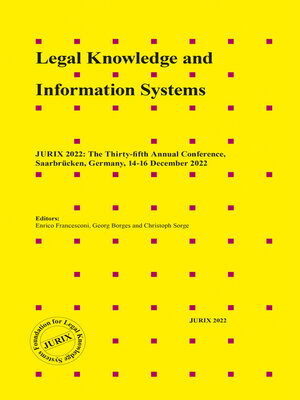Legal Knowledge and Information Systems
ebook ∣ JURIX 2022: The Thirty-fifth Annual Conference, Saarbrücken, Germany, 14-16 December 2022 · Frontiers in Artificial Intelligence and Applications
By Georg Borges

Sign up to save your library
With an OverDrive account, you can save your favorite libraries for at-a-glance information about availability. Find out more about OverDrive accounts.
Find this title in Libby, the library reading app by OverDrive.



Search for a digital library with this title
Title found at these libraries:
| Library Name | Distance |
|---|---|
| Loading... |
In recent years, interest within the research community and the legal industry regarding technological advances in legal knowledge representation and processing has been growing. This relates to areas such as computational models of legal reasoning, cybersecurity, privacy, trust and blockchain methods, among other things.
This book presents the proceedings of JURIX 2022, the 35th International Conference on Legal Knowledge and Information Systems, held from 14 –16 December in Saarbrücken, Germany, under the auspices of the Dutch Foundation for Legal Knowledge Based Systems and hosted by Saarland University. The annual JURIX conference has become an international forum for academics and professionals to exchange knowledge and experiences at the intersection of law and artificial intelligence (AI). For this edition, 62 submissions were received from 163 authors in 24 countries. Following a rigorous review process, carried out by a programme committee of 72 experts recognised in the field, 14 submissions were selected for publication as long papers, 22 as short papers and 5 as demo papers, making a total of 41 papers altogether and representing a 22.5% acceptance rate for long papers (66.1% overall). The broad array of topics covered includes argumentation and legal reasoning, legal ontologies and the semantic web, machine and deep learning and natural language processing for legal knowledge extraction, as well as argument mining, translation of legal texts, defeasible logic, legal compliance, explainable AI, alternative dispute resolution, legal drafting and smart contracts.
Providing an overview of recent advances, the book will be of interest to all those working at the interface between the law and AI.







